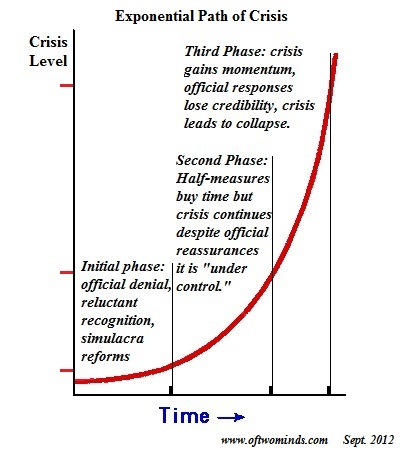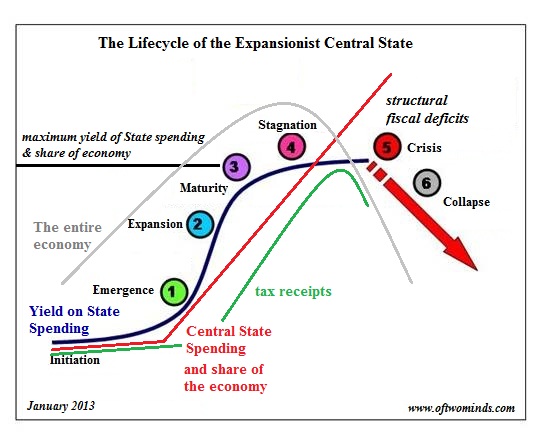by Charles Hugh Smith
Fostering illusions of prosperity only further cripples our ability to make the necessary difficult decisions.
Have you ever noticed that the decisions made in times of abundance are generally bad? Bad might be too weak a word; catastrophically bad might be more accurate. This causal connection between abundance and flawed decision-making was one of the many stimulating ideas that came up during an afternoon with Aengus Anderson, host of the excellent audio program series The Conversation.
This dynamic has two sources:
1. There is no pressure in eras of abundance to make difficult choices. Since everything is going so swimmingly, "more of the same" is what everyone wants. After all, why risk upsetting the gravy train?
2. This pressure to maintain the Status Quo whittles down the options even being discussed to politically safe pseudo-reforms. Any ideas that are outside the more of the SAME box are dismissed or marginalized. (SAME: Socially acceptable middling effort--a telling acronym I found in the work of Michael O. Church.)
As a result of this paring away of all bold, daring ideas and solutions, the Status Quo toolbox is devoid of authentic solutions when the bad decisions finally catch up and the era of abundance devolves into scarcity.
This reliance on more of the SAME pseudo-reforms to address emerging crises leads to a policy of doing more of what has failed spectacularly and Going Through the Motions of reform to placate critics.
This dearth of concepts and policies that actually address the unfolding crises creates the phase-shift escalation of crisis and failed reform depicted in this chart:

Both the Power Elites and the general populace have been crippled by abundance:since no one has been forced to make difficult decisions for so long, the leadership and the public have both lost the ability and will to make demanding analyses and choices.
Since there are no tools left in the policy tool box and no ability to fashion new tools, the Status Quo figuratively tries to pound down nails with a screwdriver. Of course they fail, and fail spectacularly; they don't have the right tools. All they have is socially and politically acceptable pseudo-reforms and simulacra big ideas.
Examples of pseudo-reforms and simulacra big ideas include trillion-dollar boondoggles such as ObamaCare, the $1 trillion student loan "solution" to higher education costs and the F-35 fighter aircraft program.
All of these are simply increasingly costly more of the SAME.
This is not a political dynamic: it is a human-nature dynamic. When do we spend more than is prudent on big-ticket consumables? When we feel the glow of abundance (what the Federal Reserve calls the wealth effect). When do we join the herd gambling on housing or stocks? When everyone's winning and abundance is flowing everywhere. When do we over-promise future commitments? When there appears to be no end to ever-rising abundance.
This dynamic of over-promising future commitments and squandering money is a key reason the expansive central state is doomed to crisis and failure.

When do we buckle down and open our minds to solutions and alternatives that we didn't need to even consider in eras of abundance? When things get dicey and scarce. When do we start looking at expenses? Certainly not when money is easy to borrow.
There is one last sobering dynamic we need to ponder. For the past five years of suppressed crisis, central states around the world have chosen to create an artificial sense of abundance by printing or borrowing trillions of dollars of fiat money and flooding their economies with this false abundance.
This false abundance has led to a continuation of bad decision-making, as it has nurtured a magical-thinking faith that the era of abundance can be conjured up with monetary tricks. This is the essential feature of cargo cults, the magical-thinking belief in the return of abundance without having to chart a new path of authentic reforms.
No comments:
Post a Comment